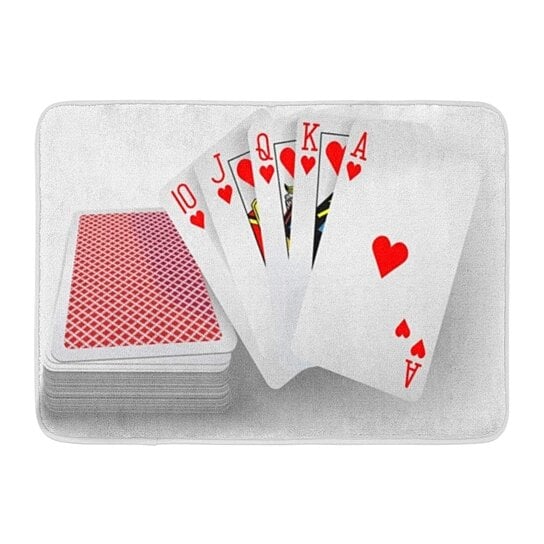Play Flush

Rules of Play
Mississippi Stud is a table game played like a shortened version of Texas hold'em.Each player makes an ante bet and is dealt two cards, face down. These cards are kept secret from other players. Play Teen Patti Flush: 3 Patti Poker with millions of real friends! It’s a traditional online multiplayer Indian poker game but with more advanced social and gaming functions than ever. Poker is almost always played with the standard 52-card deck, the playing cards in each of the four suits (spades, hearts, diamonds, clubs) ranking A (high), K, Q, J, 10, 9, 8, 7, 6, 5, 4, 3, 2, A (low only in the straight a series of five cards numbered consecutively or straight flush a series of five cards numbered consecutively within the. We would like to show you a description here but the site won’t allow us. Flush is a fast and simple toilet finder. It has a slick interface with beautiful animations and transitions inspired by material design. The database of tens of thousands of public toilets is.
- Players must make equal bets on the Ante and the X-Tra Bonus. They may also make an optional Same Suit Bonus.
- Each player and the dealer receives 3 hole cards.
- Players then make a choice of checking or betting 3x their Ante on the All In bet.
- *Once players bet, they cannot bet again and they cannot change their bet.
- The dealer then places the first two community cards (the Flop) face up on the layout.
- Players that have not yet made an All In bet have a choice of checking or betting 2x their Ante on the All In bet.
- The dealer then places the final two community cards (the Turn and the River) face-up on the layout.
- Players that have not yet made an All In bet have a choice of folding or betting 1x their Ante on the All In bet.
- The dealer then reveals his three hole cards and announces his seven-card flush.
- The dealer needs a 9 high three-card flush in order to qualify. If the dealer does not qualify all Ante bets push. The player must beat the dealer to win the All In bet and X-Tra Bonus bet.
- When the dealer qualifies and the player’s flush beats the dealer’s flush, the All In and Ante bets win even money.
- When the dealer qualifies and the player’s hand loses to the dealer, the All In, Ante and X-Tra Bonus bets lose.
- When the hands tie, the All In, Ante and X-Tra Bonus bets push.
- The X-Tra Bonus bet wins when the player beats the dealer with four or more cards of the same suit. See paytable for odds. If the player wins with less than a four card flush then the X-Tra Bonus bet pushes.
- The Same Suit Bonus bet wins if the player has a four card flush or higher. Player does not have to win hand to win Same Suit Bonus. See paytable for odds.
VIEW RACK CARD
Note
This module is part of ansible-base and included in all Ansibleinstallations. In most cases, you can use the short module namemeta even without specifying the collections: keyword.Despite that, we recommend you use the FQCN for easy linking to the moduledocumentation and to avoid conflicting with other collections that may havethe same module name.
Meta tasks are a special kind of task which can influence Ansible internal execution or state.
Meta tasks can be used anywhere within your playbook.
This module is also supported for Windows targets.
| Parameter | Choices/Defaults | Comments |
|---|---|---|
| free_form string / required |
| This module takes a free form command, as a string. There is not an actual option named 'free form'. See the examples! flush_handlers makes Ansible run any handler tasks which have thus far been notified. Ansible inserts these tasks internally at certain points to implicitly trigger handler runs (after pre/post tasks, the final role execution, and the main tasks section of your plays).refresh_inventory (added in Ansible 2.0) forces the reload of the inventory, which in the case of dynamic inventory scripts means they will be re-executed. If the dynamic inventory script is using a cache, Ansible cannot know this and has no way of refreshing it (you can disable the cache or, if available for your specific inventory datasource (e.g. aws), you can use the an inventory plugin instead of an inventory script). This is mainly useful when additional hosts are created and users wish to use them instead of using the ansible.builtin.add_host module.noop (added in Ansible 2.0) This literally does 'nothing'. It is mainly used internally and not recommended for general use.clear_facts (added in Ansible 2.1) causes the gathered facts for the hosts specified in the play's list of hosts to be cleared, including the fact cache.clear_host_errors (added in Ansible 2.1) clears the failed state (if any) from hosts specified in the play's list of hosts.end_play (added in Ansible 2.2) causes the play to end without failing the host(s). Note that this affects all hosts.reset_connection (added in Ansible 2.3) interrupts a persistent connection (i.e. ssh + control persist)end_host (added in Ansible 2.8) is a per-host variation of end_play. Causes the play to end for the current host without failing it. |
Note
Play Flush Fever Online
metais not really a module nor action_plugin as such it cannot be overwritten.clear_factswill remove the persistent facts from ansible.builtin.set_fact usingcacheable=True, but not the current host variable it creates for the current run.Looping on meta tasks is not supported.
Skipping
metatasks with tags is not supported before Ansible 2.11.This module is also supported for Windows targets.
See also
The official documentation on the ansible.builtin.assert module.
Play Flush Draw
The official documentation on the ansible.builtin.fail module.

Authors¶
Play Flushed Away Game Online
Ansible Core Team